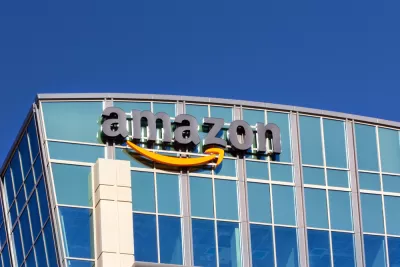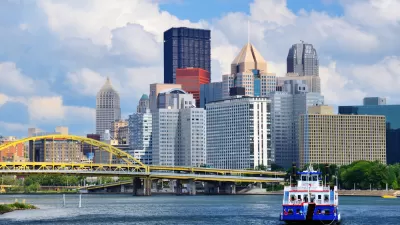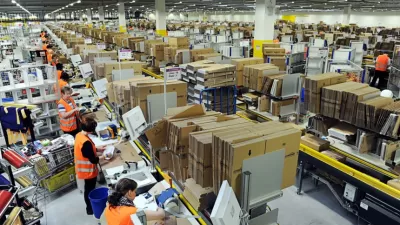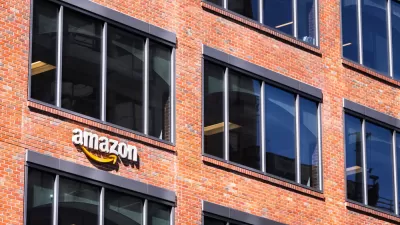In Baltimore, Amazon is at the center of a complicated web of products, services, and industries that is virtually impossible to avoid.

Scott Shane explores Amazon’s vast influence in the modern world by taking a closer look at the many ways it has deeply affected labor, commerce, transportation, and everyday life in Baltimore.
He starts with the area’s Amazon fulfillment centers—located on former General Motors and Bethlehem Steel sites. In a city that has lost most of its unionized industrial jobs, Amazon jobs are in demand, even without providing comparable pay and security. In addition, local officials have offered Amazon $65 million in tax breaks and loans to locate in Baltimore.
"But economists say online shopping has also erased thousands of retail jobs, and critics point to other costs, including traffic congestion and environmental effects, so assessing the company’s net impact is difficult," notes Shane.
Shane continues on by tracing Amazon’s expansion into a multitude of sectors and industries far beyond its start in online retail, including government and institutional procurement, freight and shipping, and cloud computing and software. While Baltimore offers just one example of a city contending with Amazon’s far-reaching influence, its experience highlights the important decisions city officials need to make and the lessons to be learned from past missteps.
"[Amy Webb] called the contest for Amazon’s second headquarters a 'ridiculous parade, a beauty contest' in which communities nationwide offered up inducements while failing to make a cleareyed assessment of costs and benefits. With its capabilities, market sway and long-term strategy, she said, Amazon now conducts itself like a 'nation-state,'" writes Shane.
FULL STORY: Prime Mover: How Amazon Wove Itself Into the Life of an American City

Planetizen Federal Action Tracker
A weekly monitor of how Trump’s orders and actions are impacting planners and planning in America.

Chicago’s Ghost Rails
Just beneath the surface of the modern city lie the remnants of its expansive early 20th-century streetcar system.

San Antonio and Austin are Fusing Into one Massive Megaregion
The region spanning the two central Texas cities is growing fast, posing challenges for local infrastructure and water supplies.

Since Zion's Shuttles Went Electric “The Smog is Gone”
Visitors to Zion National Park can enjoy the canyon via the nation’s first fully electric park shuttle system.

Trump Distributing DOT Safety Funds at 1/10 Rate of Biden
Funds for Safe Streets and other transportation safety and equity programs are being held up by administrative reviews and conflicts with the Trump administration’s priorities.

German Cities Subsidize Taxis for Women Amid Wave of Violence
Free or low-cost taxi rides can help women navigate cities more safely, but critics say the programs don't address the root causes of violence against women.
Urban Design for Planners 1: Software Tools
This six-course series explores essential urban design concepts using open source software and equips planners with the tools they need to participate fully in the urban design process.
Planning for Universal Design
Learn the tools for implementing Universal Design in planning regulations.
planning NEXT
Appalachian Highlands Housing Partners
Mpact (founded as Rail~Volution)
City of Camden Redevelopment Agency
City of Astoria
City of Portland
City of Laramie





























